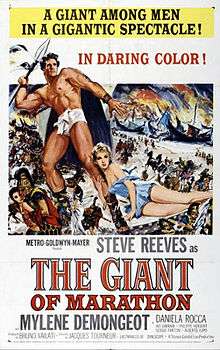The Giant of Marathon
| The Giant of Marathon | |
|---|---|
 Theatrical release poster | |
| Directed by |
Jacques Tourneur Mario Bava |
| Produced by | Bruno Vailati |
| Written by |
Alberto Barsanti (story) Ennio De Concini (writer) Augusto Frassinetti (writer) Raffaello Pacini (story) Bruno Vailati (writer) |
| Starring |
Steve Reeves Mylène Demongeot Daniela Rocca Ivo Garrani Philippe Hersent |
| Music by | Roberto Nicolosi |
| Cinematography |
Mario Bava Masino Manunza |
| Edited by | Mario Serandrei |
| Distributed by | Metro-Goldwyn-Mayer |
Release date | 3 December 1959 |
Running time | 90 minutes |
| Country |
Italy France |
| Language | English |
| Box office | $13.6 million[1] |
La battaglia di Maratona (English version: The Giant of Marathon) is a 1959 Italian/French international co-production sword and sandal film, loosely based on the Battle of Marathon. It was directed by Jacques Tourneur and Mario Bava (Bava had to step in to complete the film). It starred Steve Reeves as Phillipides.
Plot
The story is set in 490 BC, the time of the Medic Wars, during which Persian armies sweep through the Ancient world. Having brought home to Athens the Olympic victor's laurel crown, Phillippides becomes commander of the Sacred Guard, which is expected to defend the city-state's liberty, a year after the expulsion of the tyrant Hippias.
Athenian supporters of Hippias conspire, hoping to sideline Phillippides with a marriage to Theocrites' expensive servant Charis, and thus neutralize the guard. She fails to seduce him, as his heart is already taken by a young girl before he learns her name is Andromeda, daughter of Creuso.
Everything personal is likely to be put on hold when the news breaks that the vast army of Darius, the Persian King of Kings, is marching on Greece, hoping that its internal division will make its conquest a walk-over. Theocrites instructs Miltiades to hold back the Sacred Guard to defend the temple of Pallas after a likely defeat, and proposes instead to negotiate terms with Darius, but is told an alliance with Sparta could save the Hellenic nation.
Phillippides makes the journey and survives an attempt on his life by conspirators; he returns with Sparta's engagement during the Persian attack in far greater numbers on Militiades valiant troops. Charis, left for dead after overhearing Darius's orders, reaches the camp to tell that the Persian fleet, now commanded by the traitor Theocrites, is heading for the Piraeus to take Athens. Miltiades sends Phillippides ahead to hold out with the Sacred Guard until his hopefully victorious troops arrive, and after his perilous journey back they do a great job.
Cast
- Steve Reeves as Phillipides
- Mylène Demongeot as Andromeda, Creuso's daughter
- Sergio Fantoni as Theocritus
- Daniela Rocca as Charis
- Philippe Hersent as Callimachus
- Alberto Lupo as Miltiades
- Daniele Vargas as Darius I, King of Persia
- Miranda Campa as Andromeda's handmaid
- Gianni Loti as Teucro
- Anita Todesco as Andromeda's friend
- Ivo Garrani as Creuso
- Sergio Ciani as Euros
- Franco Fantasia
- Carlo Lombardi
- Ignazio Balsamo
- Gian Paolo Rosmino
- Walter Grant
Production
Ten days before the premiere, director Mario Bava was forced to reshoot exterior scenes because several extras were spotted smoking cigarettes on camera.[2]
Box office
The movie was very successful at the box office: according to MGM records the film earned $1,335,000 in the US and Canada and $1.4 million elsewhere resulting in a profit of $429,000.[3]
Biography
- Hughes, Howard (2011). Cinema Italiano - The Complete Guide from Classics to Cult. London - New York: I.B.Tauris. ISBN 978-1-84885-608-0.
See also
References
- ↑ http://www.jpbox-office.com/fichfilm.php?id=15070
- ↑ Hughes, p.49
- ↑ The Eddie Mannix Ledger, Los Angeles: Margaret Herrick Library, Center for Motion Picture Study.
External links
- The Giant of Marathon on IMDb
- The Giant of Marathon is available for free download at the Internet Archive
- The Giant of Marathon at AllMovie
- The Giant of Marathon at Rotten Tomatoes